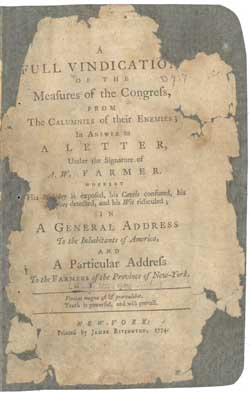Collections Online
A Full Vindication of the Measures of the Congress ...
To order an image, navigate to the full
display and click "request this image"
on the blue toolbar.
-
Choose an alternate description of this item written for these projects:
- Main description
[ This description is from the project: Coming of the American Revolution ]
In reply to Samuel Seabury’s pseudonymous "Free thoughts on the proceeding of the Continental Congress ...", Alexander Hamilton defends the Continental Congress against loyalist attacks in this pamphlet.
Colonists Rally Around Congress
The very existence of the Congress, not to mention its proceedings, ignites another war of words in the colonies. Among those providing commentary is Alexander Hamilton, who takes up his pen to defend the Congress against loyalist attacks, particularly those of Samuel Seabury. Ultimately, the loyalists' efforts fail to inspire either colonists or colonial legislatures to disavow the measures set forth by Congress. Throughout the fall of 1774 and winter of 1775, most colonial legislatures (New York excepted) endorse the body's proceedings. Nearly 7,000 individuals across the colonies are elected to committees created to uphold the Association. Throughout the winter and spring of 1775, colonists eagerly await a response from King and Parliament.
Questions to Consider
1. How does Alexander Hamilton characterize those writers opposed to the Congress? What does he think of their writings? Why does he choose to write in response to them?
2. According to Hamilton, what is the "subject of our [the colonists] controversy" with Great Britain?
3. Why does Hamilton argue that a restriction on trade is necessary? Does he believe these restrictions will succeed? Why or why not?
4. What group does Alexander Hamilton address beginning on page 23? Why do you think he addresses this particular group?
Further Exploration
5. Alexander Hamilton was just a teenager when he wrote this pamphlet. He went on to a brilliant career in American politics. Research Hamilton's life and write a brief description of some of his other accomplishments. You can visit the New-York Historical Society's website for more information about Alexander Hamilton: http://www.alexanderhamiltonexhibition.org.

